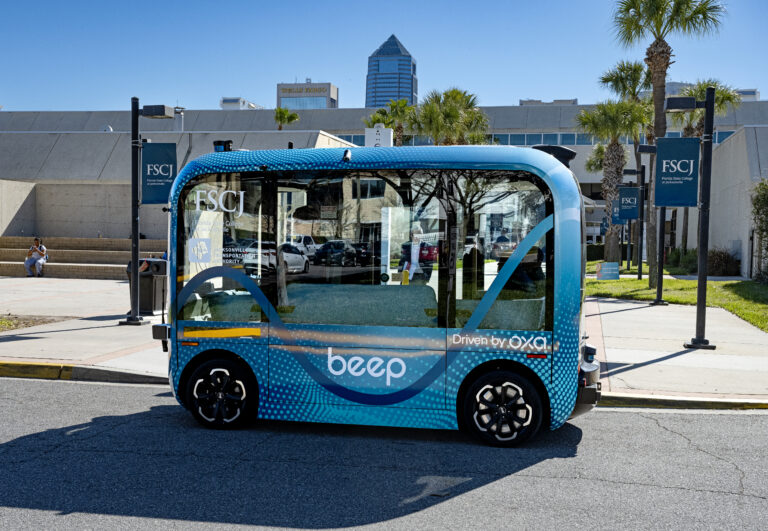The code has hit the road for Oxa, a global provider of self-driving vehicle software, as the company launches its first commercial Oxa Driver product in passenger shuttles in Jacksonville, Florida. The services are a major investment in the city’s downtown area and are operated by US shuttle service provider Beep in partnership with the Jacksonville Transport Authority (JTA) and the Florida State College at Jacksonville (FSCJ).
The shuttles are part of an autonomous vehicle (AV) program licensed by the US National Highway Traffic Safety Administration (NHTSA). They support the JTA and FSCJ’s ambition to become beacons for autonomous transportation as the college builds AV skills into its academic track and the city begins major investment in autonomous transportation as part of an Ultimate Urban Circulator Project.
“This initiative is a testament to years of hard work and collaboration between the private and public sector, including the US Department of Transportation,” said JTA CEO Nat Ford. “We are eager for the FSCJ campus and the wider Jacksonville community to experience these AVs firsthand to see the benefits they bring.”
Oxa Driver enables vehicle automation independent of human control but trained safety attendants will be used on the FSCJ route to boost confidence and trust while passengers get used to the self-driving experience. The first rollout will be followed by seven more featuring Oxa software planned in cities across the US and UK in 2024.
“The AV market is in a really interesting place as the number of innovators begins to shrink in a battle of business and technology models,” said Gavin Jackson, CEO of Oxa. “My view is AV technology won’t be commercially viable in cars or taxis for a decade so focus should shift to the mass movement of people and goods, specifically shared passenger systems such as the FSCJ shuttle, and industrial logistics. These sectors suffer from severe driver shortages yet they also offer huge public and business benefits if they can be enhanced – and autonomy can do that in a cost-effective way now.”
Oxa says Beep’s deployment makes it the first and only UK company exporting deployment-ready self-driving vehicle software into the global market. Oxa calculates the two most viable arenas – passenger shuttles and industrial logistics – will form an addressable software market worth multi-billions of dollars a year. This is based on the number of vehicles that can benefit from self-driving software, potential revenue per vehicle, and the commercial and technological viability of making the shift.
Oxa Driver is the culmination of 10 years of invention, software engineering, hardware integration, machine learning and testing in the virtual and real worlds; the product of millions of hours of engineering development.
According to Oxa founder and chief technology officer Professor Paul Newman CBE, “Deploying Oxa Driver in passenger shuttles playing a key role in a community’s regeneration is momentous. When I started Oxa in 2014, my vision was that autonomous vehicles should be a noticeable force for good, not only improving driving safety but also in elevating possibilities for people. It’s easy to get caught up in the technology but FSCJ proves that when science meets purpose, and it adds up financially, you have a powerful reason to go faster and further, and that’s exactly what we’ll do now”
New US and UK routes
US shuttle services running Oxa Driver are being deployed in partnership with Oxa’s strategic US fleet operations partner Beep. The company is delivering programs across six states in more than two dozen communities and is in the vanguard of deploying autonomy across North America.
“Our partnership with Oxa is off to a great start, and we’re very pleased with the results of our first autonomous shuttle deployment in Jacksonville, in concert with our partners at the Jacksonville Transportation Authority and Florida State College at Jacksonville,” said Joe Moye, CEO for Beep. “Oxa Driver provides an enhanced passenger experience and elevated operational capabilities to further improve safety, and we’re excited to expand the deployments of this joint solution, with six additional sites currently planned for 2024.”
The range of autonomous shuttle deployments is broad; from catalysing regeneration in downtown Jacksonville to serving science parks and well-established areas like Lake Nona in Orlando, Florida. Lake Nona is a pioneering 17-square-mile community known for integrating cutting-edge technology to optimize mobility and lifestyle options; a commitment to innovation that has drawn in multiple Fortune 500 companies. The area is grounded on a gigawatt network infrastructure and is home to Wave Lake Nona, celebrated as the world’s most technologically advanced hotel.
Other city services yet to be announced in 2024 will be a mix of private and public transportation shuttles using a variety of vehicle types from fully customized to retrofitted commercial platforms.


